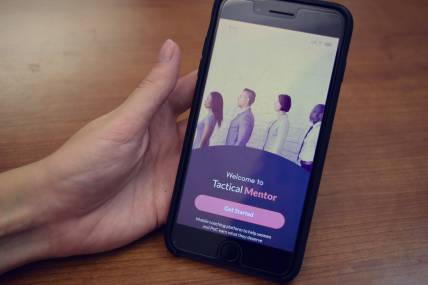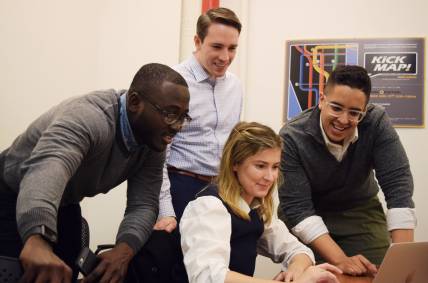Social Impact, Innovation, and Investment students use team-generated Capstone option to launch startup ideas

While NYU Wagner’s Capstone program has traditionally focused on a direct client project, one of the newer Master of Public Administration specializations has provided students with a chance to take an entrepreneurial approach to the crowning piece of their degree. With the first cohort of Social Impact, Innovation, and Investment (SI3) students about to graduate, a handful of them may also be set to launch their startup ideas.
One of those teams is Tactical Mentor, an online coaching platform designed to support women and people of color in negotiating better compensation packages.
“In terms of wage gap, we’re looking at the unexplained portion, based on the fact that it has been found that women and people of color are both less likely to negotiate and more likely to be penalized for negotiating,” says Harriet Flavel. “We’re trying to give them the information, support, and practice to negotiate better packages for themselves, so they’re closer to market parity.”
The Tactical Mentor team includes Flavel, along with classmates Michael Brocker, Jeffrey Jiménez, Jasiel Martin-Odoom, and Jasmin Matos. While Brocker had an initial idea for a platform that would provide insight into companies through a peer-to-peer network, he knew it was lacking a social impact factor and turned to Professor Scott Taitel to help evolve the project.

As any entrepreneurial idea goes, it has been an iterative process and they’ve learned to pivot and adapt along the way. They’ve also learned to marry the academic world with the startup one by infusing their research into building a product that works for their users.
“We sit down and whiteboard and think about what something can look like that was only in our heads, and now it’s in the world and that’s special,” says Jiménez. “[Team-based Capstone] was an opportunity to do something that was larger than us and something that we can show people and talk about and see if we can kick it off the ground.”
As they’ve done user interviews on their prototype, the team has witnessed real-world applications for how a platform like Tactical Mentor could simply open up the possibility for women and people of color to negotiate better packages when those users have otherwise not even considered negotiations to be applicable to them.
“A lot of times with these big systemic issues, people will look for a policy solution and that can be the answer,” says Brocker. “At the same time, what we’re offering up is a solution where people on a very individual level can empower themselves and become their own change advocates.”
Startup ventures have their risks and require a unique range of skills, but Martin-Odoom sees SI3 students as the kind of individuals who can thrive at the intersection of private, public, and nonprofit worlds.
“I came to a school of public service and policy because I wanted to work with a social impact lens,” he says. “SI3 gave me the intersection where I am able to look at all the variables—corporate finance, innovation, and impact investment—to prepare me for what is I want to do.”